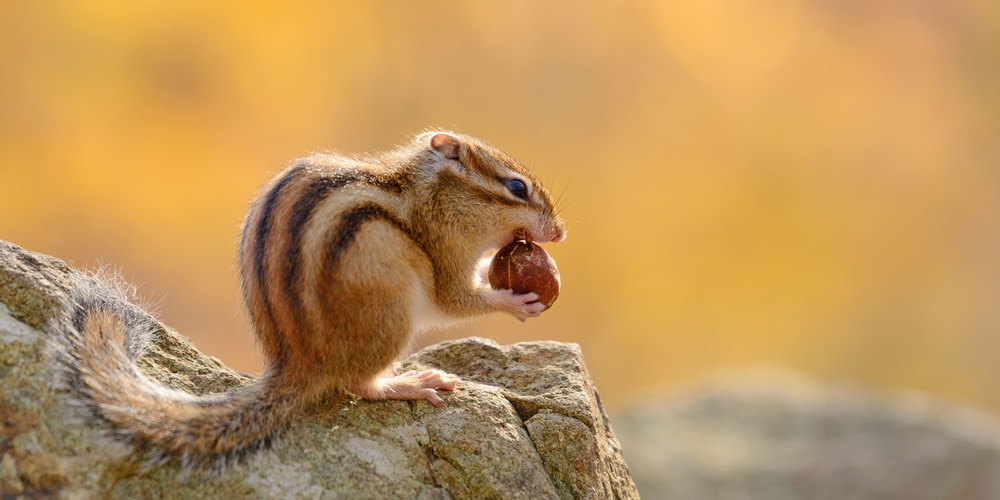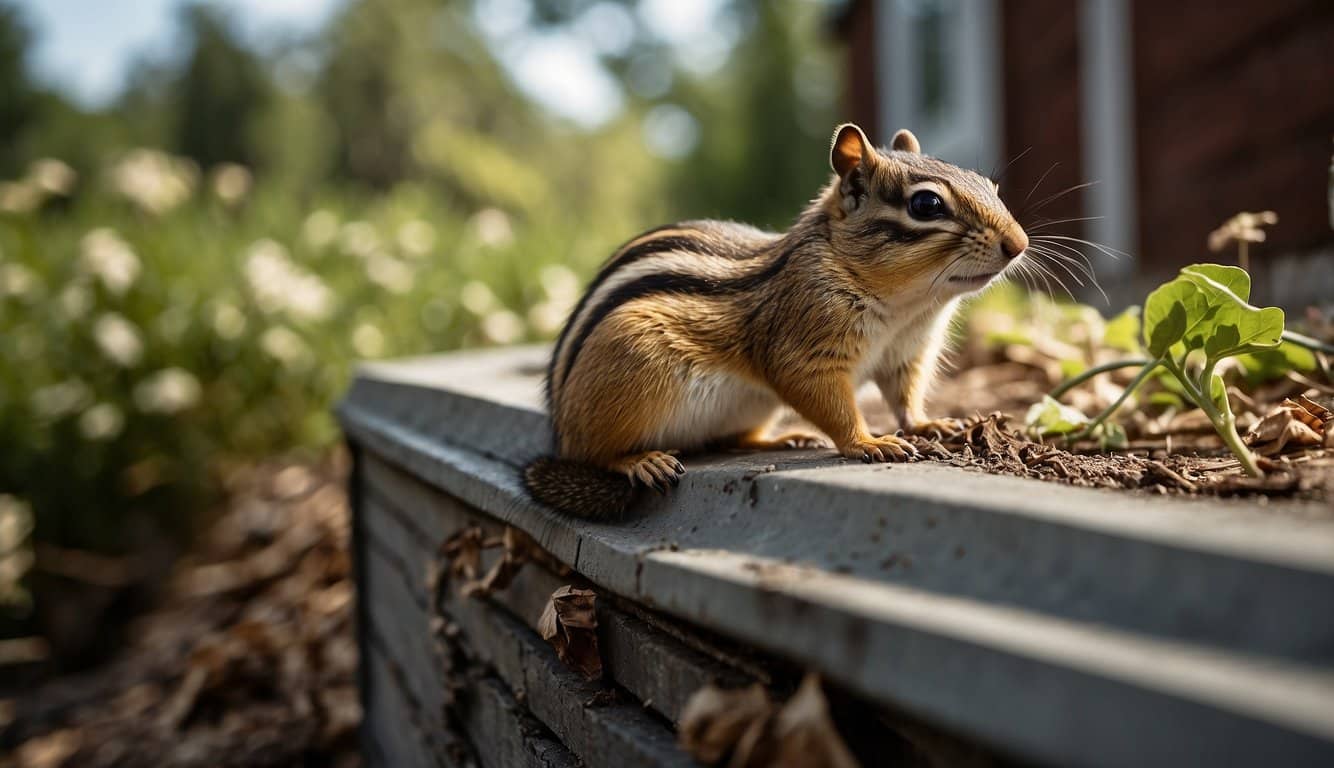Natural Chipmunk Deterrents
In your quest for a harmonious backyard, natural barriers can be your frontline defense against chipmunks.
Here’s a breakdown of nature-friendly options to safeguard your green space.
Plant Repellents
- Daffodils and Garlic: Chipmunks are not fans of certain plant aromas. Consider planting daffodils and garlic, as their strong scents act as natural repellents.
- Marigolds and Chrysanthemums: These vibrant flowers not only add color to your garden but also deter chipmunks with their fragrance.
Predator Urine
- Fox and Coyote Urine: The scent signals danger, effectively keeping chipmunks at bay.
- You can find these products online or at your local garden center.
Natural Sprays
- Cayenne Pepper Spray: Mixing cayenne pepper with water creates a spicy deterrent. Spray it around your garden to discourage these small critters from entering.
- Ammonia Solution: Soak rags in ammonia and place them in areas where chipmunks frequent—the strong smell keeps them away.
Physical Barriers and Traps
When it comes to keeping chipmunks at bay, combining physical barriers and traps offers a strategic approach.
Be strategic and precise—your flower bulbs and vegetables will thank you!
Exclusion Techniques
- Plant Bulbs Smartly: To protect your flower bulbs, try planting them beneath a layer of 1/4-inch hardware cloth or in specially designed bulb cages.
- Cover with soil, and let your plants thrive without chipmunk interference.
- Mesh Fencing: Install a fence of 1/4-inch mesh hardware cloth around your garden.
- Bury it a few inches underground to prevent chipmunks from burrowing underneath.
Live Traps
- Humane Capturing: Utilize live traps baited with goodies like peanut butter or seeds.
- Upon capture, you can relocate chipmunks to a forested area, far from your precious greenery.
- Check Regularly: Always check traps daily to avoid any distress to the trapped animal and provide proper care quickly.
Lethal Solutions
- Lethal Traps: While less humane, lethal traps are an option.
- Be sure to use them responsibly and follow local wildlife regulations.
- Professional Help: If you opt for this method and are unsure about the process, seek assistance from a licensed pest control professional.
Chipmunk-Proofing Your Home
Before these furry little acrobats turn your home into their personal playground, it’s time to chipmunk-proof your castle with precision!
Follow these specific steps to ensure these critters bounce off your defenses instead of breezing through them.
Foundation Checks
First things first, secure the fortress by:
- Inspecting your foundation for cracks or crevices.
- Chipmunks are tiny, but they can slip through small spaces.
- Sealing holes using caulk or metal mesh.
- Don’t just cover them; make it last so those critter gymnasts can’t make a return performance.
Securing Entry Points
Next, it’s time to lock down the entrances:
- Install door sweeps on exterior doors to block off their stage door entry.
- Check vents and windows. Screens should be intact and tight-fitting; any tears mean it’s showtime for chipmunks.
- Cap the chimney. If you don’t, it’s like rolling out the red carpet and asking for a squirrel soiree.
Maintenance Practices
Maintain the barricades with a few smart moves:
- Keep your garden tidy; eliminate chipmunk food sources by cleaning up fallen fruits and nuts.
- Trim back trees and shrubs from the house to remove aerial highways for these tiny tightrope walkers.
Professional Removal Services
If you’re facing a chipmunk invasion, sometimes the DIY approach just doesn’t cut it. That’s where professional removal services come into play. Here’s where to turn when you need the pros:
- Safe and Humane: Professional services ensure the humane capture and relocation of your bushy-tailed visitors. Safety is key, both for you and the chipmunks!
- Time-saving: Let’s face it, your time is precious. Hiring a pro saves you the hassle of dealing with these critters yourself.
- Expert Assessment: Pros can provide a thorough inspection to determine the extent of the problem and identify potential entry points to prevent future issues.
What to Expect from the Pros
- Inspection: A thorough examination of your premises to pinpoint the issue.
- Plan of Action: Crafting a strategy tailored to your specific chipmunk conundrum.
- Removal: Using traps and baits to effectively capture the chipmunks.
- Exclusion: Suggestions and measures to prevent future invasions.
Services like Rentokil and Critter Control specialize in wildlife removal, hence they are well-versed in dealing with chipmunk removal efficiently.
Always ensure to check for:
- Licensing and Insurance: For your peace of mind and their credibility.
- Humane Methods: Ensuring that the critters are treated with care.
- Follow-up Support: Look for services that offer guidance post-removal.
Preventative Landscaping Changes
Making strategic changes to your landscape can play a pivotal role in deterring chipmunks from your property.
By implementing specific garden adjustments and applying deliberate planting strategies, you create an environment that’s less inviting for these critters.
Garden Adjustments
- Tidy Up: Chipmunks love hiding and nesting in cluttered spaces. Keep your garden free of debris such as leaf piles, accumulations of stones, and unorganized woodpiles.
- Structured Spacing: Cultivate plants in a manner that allows you to walk comfortably between them. This discourages chipmunks from burrowing and creating hidden pathways.
Strategic Planting
- Repellent Plants: Include plants that chipmunks dislike such as garlic and daffodils. Their strong odors are a natural deterrent.
- Barriers: Plant thick, prickly hedges like hawthorn or berberis as a physical boundary that’s difficult for chipmunks to penetrate.
Frequently Asked Questions
In tackling the chipmunk conundrums you face, let’s dive into some of the most effective strategies and remedies that can bring peace to your garden or home without causing harm to these cheeky little animals.
What humane methods can keep chipmunks at bay?
To humanely deter chipmunks, consider using non-lethal measures such as live traps.
Bait them with irresistible snacks like sunflower seeds, relocating the little critters to a more suitable habitat far from your property.
If you want detailed instructions on humane trapping, The Family Handyman highlights some clever tactics.
What are some effective home remedies to deter chipmunks?
Home remedies like sprinkling crushed red pepper flakes, garlic or peppermint oil around your property can create a no-go zone for chipmunks.
Those pungent odors are a turn-off for their sensitive noses and can help keep your grounds chipmunk-free.
How can I permanently encourage chipmunks to vacate my property?
To permanently dissuade chipmunks from calling your property home, eliminate food sources by keeping seeds, berries, and pet food sealed and indoors.
Removing cozy hiding spots, such as wood or brush piles, also makes your property less inviting.
Are there any natural predators I can introduce to control chipmunk population?
While introducing natural predators might seem like a biological control method, it’s unpredictable and could create additional problems.
Instead, make your yard less attractive to chipmunks to naturally allow predators like hawks or owls to help manage the population.
What scents or plants can repel chipmunks from my garden or home?
Chipmunks dislike the scent of garlic and daffodils, so planting these can serve as a natural deterrent.
For more gardening tips that chipmunks detest, check out the advice over at Bob Vila.
How can I chipmunk-proof my home’s foundation and prevent them from burrowing?
To prevent chipmunks from burrowing around your home’s foundation, install hardware cloth or gravel around the perimeter.
Keep any shrubbery trimmed and remove piles of debris to reduce hiding spots.
Sealing any small exterior holes with caulk or concrete can also block their entry.
Last update on 2025-06-06 / Affiliate links / Images from Amazon Product Advertising API





